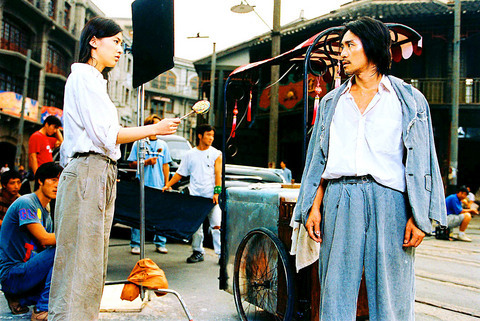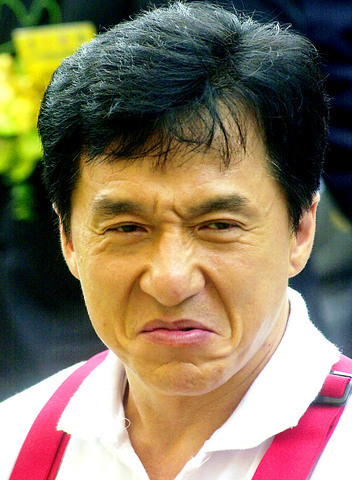The industry that launched Jackie Chan (
Once a powerhouse that churned out 300 movies a year and had box-office takings of more than a billion Hong Kong dollars annually in the mid-1990s, the industry is now just a shade of its past glory.
In 2004, Hong Kong produced a measly 64 features and took HK$445 million (US$57 million) at the box office.

PHOTO:REUTERS
"You can't even call it an industry," said Woody Tsung, chief executive of the Hong Kong, Kowloon & New Territories Motion Picture Industry
Association.
Industry insiders blame video-disc piracy -- widespread in Asia -- and the rise of computer download services for siphoning off profits and spooking movie

PHOTO: AP
investors.
Hong Kong moviemakers are now turning to China's market, co-productions with foreigners and new forms of film financing to try to mount a recovery. They're also pressing the government for better protection of intellectual property.
China recently removed quota restrictions on Hong Kong films under a free-trade deal. But there are just three Chinese distributors authorized to import movies from the territory, making it tough to get a good prices for distribution rights.
"If those three companies don't buy the film, then there's nothing to talk about," Tsung said. "Our bargaining power is much smaller."
While China's market of 1.3 billion potential viewers is mouthwatering, it remains largely untapped, Hong Kong industry official say, because it only has about 2,000 screens and movie watching isn't widespread.
Some analysts say one way to expand the industry may be to form greater ties with mainland China.
Film critic Law Kar envisions an industry that has China providing the backdrops and Hong Kong supplying experienced work crews, business savvy and an established global distribution network.
"The Hong Kong spirit is constantly adapting with flexibility," he said.
Law's vision of an integrated greater-Chinese movie industry has already demonstrated its potential in the Oscar-winning martial arts movie Crouching Tiger, Hidden Dragon (
Crouching Tiger cracked the coveted US market despite its non-English dialogue, grossing more than US$130 million and becoming the most popular foreign-language film in American history.
Breaking into mainstream Western markets is critical to the Hong Kong industry's success, said Tsung, the movie industry association head. In the past, Hong Kong stars like Lee and Chan have moved to America to try to make the big time.
"In the past, Hong Kong and Chinese films were looking at the Chinatown market," he said. "Not any more. Now we're talking about the mainstream market. We want national releases. Even foreigners have to watch them."
Comedian Stephen Chow's (
The movie shattered Hong Kong box office records this year, won six Hong Kong Film Awards, including best film, and reached No. 5 at the US weekend box office.
The Hong Kong government has stepped in to help, setting up a HK$50 million (US$6.4 million) fund aimed at encouraging banks in this global financial center to back movies. The fund guarantees bank loans to movie productions and so far has been used in several productions.
Tsung said the burgeoning use of Internet file-sharing software is becoming a bigger problem than illegal copying of movies onto video discs.
One recent Hong Kong release, House of Fury (精武家庭), has been downloaded one million times worldwide, Tsung said, without saying how the figure was reached.
Authorities have cracked down on copyright violations in Hong Kong -- they recently prosecuted a man who allegedly uploaded movies using the BitTorrent file-sharing program. But piracy is very difficult to police across borders.
Sammo Hung, star of the US TV series Martial Law, worries that Hong Kong has run out of ideas because movie makers went into creative overdrive during their more prolific days.
"The backdrop of Hong Kong is small. Our thinking is narrower," Hung said. "Hong Kong exhausted all its movie ideas years ago."

Following the shock complete failure of all the recall votes against Chinese Nationalist Party (KMT) lawmakers on July 26, pan-blue supporters and the Chinese Communist Party (CCP) were giddy with victory. A notable exception was KMT Chairman Eric Chu (朱立倫), who knew better. At a press conference on July 29, he bowed deeply in gratitude to the voters and said the recalls were “not about which party won or lost, but were a great victory for the Taiwanese voters.” The entire recall process was a disaster for both the KMT and the Democratic Progressive Party (DPP). The only bright spot for

Water management is one of the most powerful forces shaping modern Taiwan’s landscapes and politics. Many of Taiwan’s township and county boundaries are defined by watersheds. The current course of the mighty Jhuoshuei River (濁水溪) was largely established by Japanese embankment building during the 1918-1923 period. Taoyuan is dotted with ponds constructed by settlers from China during the Qing period. Countless local civic actions have been driven by opposition to water projects. Last week something like 2,600mm of rain fell on southern Taiwan in seven days, peaking at over 2,800mm in Duona (多納) in Kaohsiung’s Maolin District (茂林), according to

Aug. 11 to Aug. 17 Those who never heard of architect Hsiu Tse-lan (修澤蘭) must have seen her work — on the reverse of the NT$100 bill is the Yangmingshan Zhongshan Hall (陽明山中山樓). Then-president Chiang Kai-shek (蔣介石) reportedly hand-picked her for the job and gave her just 13 months to complete it in time for the centennial of Republic of China founder Sun Yat-sen’s birth on Nov. 12, 1966. Another landmark project is Garden City (花園新城) in New Taipei City’s Sindian District (新店) — Taiwan’s first mountainside planned community, which Hsiu initiated in 1968. She was involved in every stage, from selecting

The latest edition of the Japan-Taiwan Fruit Festival took place in Kaohsiung on July 26 and 27. During the weekend, the dockside in front of the iconic Music Center was full of food stalls, and a stage welcomed performers. After the French-themed festival earlier in the summer, this is another example of Kaohsiung’s efforts to make the city more international. The event was originally initiated by the Japan-Taiwan Exchange Association in 2022. The goal was “to commemorate [the association’s] 50th anniversary and further strengthen the longstanding friendship between Japan and Taiwan,” says Kaohsiung Director-General of International Affairs Chang Yen-ching (張硯卿). “The first two editions